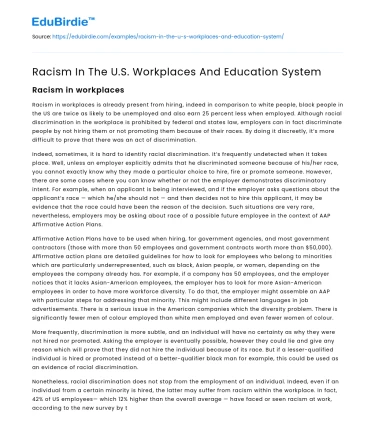Racism in workplaces
Racism in workplaces is already present from hiring, indeed in comparison to white people, black people in the US are twice as likely to be unemployed and also earn 25 percent less when employed. Although racial discrimination in the workplace is prohibited by federal and states law, employers can in fact discriminate people by not hiring them or not promoting them because of their races. By doing it discreetly, it’s more difficult to prove that there was an act of discrimination.
Indeed, sometimes, it is hard to identify racial discrimination. It’s frequently undetected when it takes place. Well, unless an employer explicitly admits that he discriminated someone because of his/her race, you cannot exactly know why they made a particular choice to hire, fire or promote someone. However, there are some cases where you can know whether or not the employer demonstrates discriminatory intent. For example, when an applicant is being interviewed, and if the employer asks questions about the applicant’s race — which he/she should not — and then decides not to hire this applicant, it may be evidence that the race could have been the reason of the decision. Such situations are very rare, nevertheless, employers may be asking about race of a possible future employee in the context of AAP Affirmative Action Plans.
Save your time!
We can take care of your essay
- Proper editing and formatting
- Free revision, title page, and bibliography
- Flexible prices and money-back guarantee
Affirmative Action Plans have to be used when hiring, for government agencies, and most government contractors (those with more than 50 employees and government contracts worth more than $50,000). Affirmative action plans are detailed guidelines for how to look for employees who belong to minorities which are particularly underrepresented, such as black, Asian people, or women, depending on the employees the company already has. For example, if a company has 50 employees, and the employer notices that it lacks Asian-American employees, the employer has to look for more Asian-American employees in order to have more workforce diversity. To do that, the employer might assemble an AAP with particular steps for addressing that minority. This might include different languages in job advertisements. There is a serious issue in the American companies which the diversity problem. There is significantly fewer men of colour employed than white men employed and even fewer women of colour.
More frequently, discrimination is more subtle, and an individual will have no certainty as why they were not hired nor promoted. Asking the employer is eventually possible, however they could lie and give any reason which will prove that they did not hire the individual because of its race. But if a lesser-qualified individual is hired or promoted instead of a better-qualifier black man for example, this could be used as an evidence of racial discrimination.
Nonetheless, racial discrimination does not stop from the employment of an individual. Indeed, even if an individual from a certain minority is hired, the latter may suffer from racism within the workplace. In fact, 42% of US employees— which 12% higher than the overall average — have faced or seen racism at work, according to the new survey by the job site Glassdoor. Which surveyed 5,241 adults in the US, UK France and Germany. And as a result, American workers were more likely to face or to witness racism. Besides, 55% of US workers say that their company should increase their diversity and inclusion.
Indeed, there are in some cases even more discrimination once the individual is employed. From a Vox article, black employees working at the Austal USA shipyard face a lot of racism: threats targeted to specific employees, with Ku Klux Klan references, ropes hanging in the breakroom in order to encourage them to commit a suicide. Even their superior referred to his black employees as monkeys.
This information shows that racism has been present since white people noticed that black people existed, this racism lasted and is still very present nowadays, especially in the US, where nearly 50 years ago took place the racial segregation. However, it does not only concern the workplace or the professional world. It is also present in schools.
Racism in schools
Currently in American and its schools, as I said earlier, there is a problem about diversity. There is a lack of it, and it seems usual to Americans, it’s integrated in the culture. The disconnections between the races, racism and some discrimination are not even noticed, nor questioned. That shows that there is a strong White domination. Issues that existed hundreds of years ago still remain today. And white people have to broad-minded and receptive in order to be aware of their superiority, power and privileges they have, whereas other races and minorites don’t, and therefore it prevented America to be a society of equality.
The consequences of racism in the dominant culture throughout the years are that, in 2010, only 6% of Whites believed that racism in America still existed. That is now why people from minorities, such as students, have their dreams of equality eaten away. There is children in schools who cannot even be qualified of smart or beautiful just because of the fact that they don’t have a white skin. And that kind of discrimination often happends, is even implemented in the society and seems normal to most. These cases were the same 50 years ago.
Back in 1863 before Emancipation, teaching enslaved black people to read or write was illegal. After the abolition of slavery, for the next century and even more, most schools were segregated in America. Furthermore, public schools for minorities had much less resources than public schools for Whites. Nearly sixty years ago, African-Americans, Native Americans, and Latino students were educated in segregated schools, which were seriously underfunded. When America tried to desegregate schools, it caused bitter and violent struggles.






 Stuck on your essay?
Stuck on your essay?

